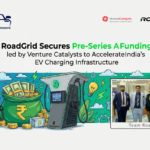
Why Fast EV Chargers are DC? An Editorial by Raman Bhatia
With the EVs gaining momentum, fast charging plays a crucial role in overcoming range anxiety and making EVs a viable option for longer journeys. But have you ever wondered why all fast chargers utilize DC instead of AC? In order to understand this it is important to understand DC and AC power and what makes them different. AC electricity constantly changes direction, flowing back and forth at a specific frequency (usually 50 or 60 Hz).
While AC is efficient for transmitting power over long distances due to minimal energy loss, it requires additional steps for battery charging. AC power needs to be converted to DC for battery charging through a process called rectification. Whereas DC electricity flows in a single, constant direction. It’s the native language of batteries, as they store and deliver energy in DC form.
The AC/DC Dilemma in EV Charging
While our homes use AC power, EV batteries operate on DC. This creates a need for conversion during charging. Here’s where the limitations of AC come into play. Firstly, AC to DC conversion incurs energy loss, reducing the overall efficiency of the charging system. This loss becomes more significant when dealing with high power levels involved in fast charging.
Secondly, AC to DC conversion requires additional circuitry like transformers and rectifiers. These components add bulk and complexity to the charging system, making them less ideal for the space-constrained environment of charging stations. Fast chargers overcome these limitations by utilizing DC power directly. Since DC is already in the same form as battery power, there’s no need for conversion.
The high-voltage DC from the charger connects directly to the battery, minimizing energy loss and maximizing charging speed. Eliminating the AC to DC conversion stage leads to a simpler and more compact design for fast chargers. This translates to potentially lower costs and easier installation at charging stations. Although fast chargers utilize DC, most EVs have an onboard AC/DC converter to handle Level 2 charging. This onboard converter allows EVs to charge from AC sources like home outlets.
Why is DC Fast Charging better?
Fast chargers primarily utilize DC power for efficient and rapid charging, offering direct electricity flow to the battery for faster rates.
DC chargers are ideal for public stations and highway rest stops due to their high-power capabilities, reducing charging times significantly and enhancing accessibility. They provide higher voltage and current levels, leading to quicker energy transfer and eliminating the need for onboard conversion. With less heat generation and scalability features, DC fast chargers offer cost-effective solutions for high-traffic areas and long-distance routes.
Standardization efforts ensure interoperability and compatibility across different EV models, promoting widespread adoption and ease of use. As battery technology advances, DC fast chargers remain essential for meeting the demands of electrified transportation and future mobility solutions.
The dominance of DC in fast charging is set to continue due to its inherent efficiency and simplified design. As EV technology advances, we may see improvements in battery capacity and charging speeds, pushing the boundaries of fast charging capabilities. Additionally, research is ongoing into alternative fast-charging technologies, such as ultra-fast charging using even higher DC voltages, further streamlining the process and reducing charging times.
The reliance on DC in fast charging stems from the fundamental difference between how power is delivered (AC) and how it’s stored in EV batteries (DC). By bypassing the conversion stage and delivering power directly in the form usable by batteries, DC fast charging achieves efficient and rapid charging, paving the way for a more convenient and future-proof EV experience.










